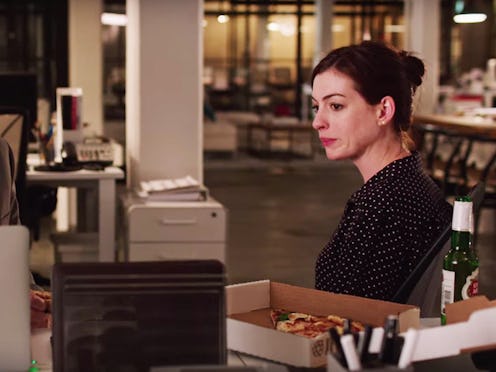Entertainment
Why Office Comedies Continue To Captivate Us

Every weekday morning, by the good graces of the double espresso and that Darwinian drive to keep your family clothed and fed, you brave the static highways or slimy subway cars to make your way down to our culture’s foremost epitome of the mundane: the office. For decades, you’ve understood the typical American workplace to represent a systematic demolition of spirit, freedom, passion — all the things a young you promised yourself you’d uphold upon passage into bona fide adulthood. To you, the job means defeat. And this might be why you're so excited to see Anne Hathaway and Robert De Niro in The Intern on Friday night.
Now, the above more than likely doesn’t ring entirely true. The societal responsibility of the working stiff, at peak during the Cold War, dissolved over the tenure of Gen X to give way to a more self-possessed approach to the hours between 9 and 5. The puerile optimism of the bracket to follow leaves us with a corporate character that is just as concerned with not missing out on the fun as everyone in its generation seems to be. But just about nobody who works any kind of office job will deny claim to the occasional feeling of disillusionment. You’ve been there, looking at the room in which you spend the bulk of your waking days to recognize an abject absence of the colors, stories, and relationships that you always hoped professional life might courier.
More than any other construct of American culture does the occupational seem to rear that dissonance. It’s no coincidence, then, that we see movies like The Intern: a rare extant glimpse of Hollywood optimism, sprouting from between the cracks of a cynical cinematic slate. Among the grim and gritty, the hollow money grabs, the baselessly nihilistic, a feature like The Intern looks and feels different. Where we might get off on the imagination of dark, thrilling, and dangerous adventures, the ultimate fantasy of office life is one of joy and charm. Moreover, of fulfillment.
The Intern, which introduces a story about website founder Anne Hathaway and her 70-year-old new hire Robert De Niro, looks to ride high on as cherished a fantasy as that which we see across the board of superhero and science fiction cinema: the extraction from those office hours of the kind of warmth, affection, family, love that it’s tough enough to find anyplace else. And The Intern does not look to be a unique enterprise as an “office fantasy.”
The trend reaches all the way back to The Apartment, which presented in the most contemptible professional environment the most alluring tale of office romance the silver screen has yet to see. How to Succeed in Business without Really Trying upended occupational hardships in light of “easy ins” and musical numbers. Working Girl delivered a victory for the underappreciated lower tier of employed America. 9 to 5, though shaky in its final act, responded to the chauvinism intrinsic in contemporaneous corporate America in fantastical screwball fashion. Brazil transformed the intricate villainy of the business system into a madcap farce. Office Space, in its open demolition of the shackles of the conglomerate cubicle in lieu of spiritual liberation, was about as vivid a portrait of wish fulfillment as Spider-Man, Captain America, or any other underdog superhero story.
Across the evolutions of the movie world have we seen a relative consistency in the “dream job” picture. More than any other fantasy do Americans seem to feed off this one, and for good reason. Delivering on wishes of long sought promotions or rewarding office relationships, the genre has played on the universal wish that office life could just be a little bit more… cinematic.
Images: Warner Bros. (3)